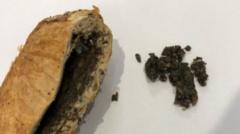Erin Patterson, a 50-year-old woman from Morwell, Victoria, has been convicted of murdering three of her relatives by serving them a beef Wellington dish tainted with the lethal death cap mushrooms. The jury also found her guilty of the attempted murder of a fourth individual, who survived the meal served on July 29, 2023.
The high-profile trial revealed meticulous evidence against Patterson, including testimonies and forensic data indicating that she specifically sought out death cap mushrooms from nearby towns prior to preparing the fatal meal. Following the serving, her former in-laws, Don and Gail Patterson, both aged 70, and Gail's sister, 66-year-old Heather Wilkinson, succumbed to poisoning within days of the dinner. Fortunately, Ian Wilkinson, Heather’s spouse, managed to recover after an extensive hospital stay.
The Supreme Court of Victoria released approximately 100 images presented during the trial, showcasing not only the crime scene but also the toxic leftovers from the meal. Authorities meticulously collected these remnants in specimen containers to ensure they could be analyzed without contamination for traces of the poisonous fungi.
Known for delivering the highest number of mushroom poisoning cases globally, death cap mushrooms pose a significant risk to human health. Their varying colors can mislead foragers, and just a minute amount can be fatal. Although Patterson asserted that she bought the mushrooms dried from an Asian grocer in Melbourne, she could not recall which store or provide payment records, stating the packaging was plain and she paid cash.
Moreover, investigators uncovered that Patterson had accessed the iNaturalist plant database, searching for sightings of death cap mushrooms in the areas surrounding Morwell, days before the meal. Her phone’s location data tracked her to these locations, and forensic examination found photographs of what appeared to be death cap mushrooms on her device.
A food dehydrator, crucially linked to the case, was disposed of by Patterson the day after the meal. Despite her claims of never owning such an appliance, evidence showed that it held her fingerprints and traces of the deadly mushrooms. CCTV footage captured her disposing of the dehydrator, contradicting her narrative.
Patterson claimed that her health began to deteriorate two days after serving the meal, and although she initially refused admission for treatment, she eventually sought medical help. Thankfully, her children who consumed the leftovers tested negative for mushroom poisoning.
The legal proceedings spanned nine weeks, capturing the attention and curiosity of the public due to the intricate details surrounding the case and the profound consequences of one meal. After delivering their verdict, the courtroom was left in a mix of somber reflection and disbelief over the tragic events that unfolded in what was initially intended to be a family gathering.

















